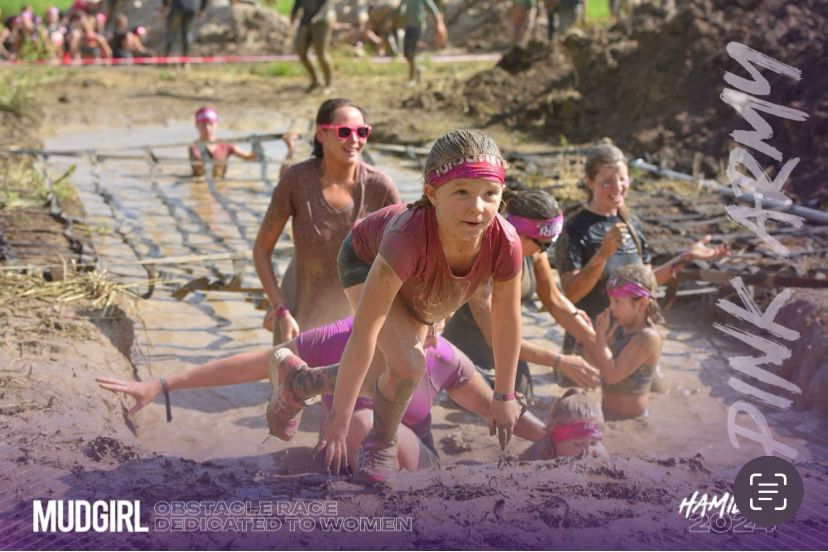· Changing the Narrative Starts in the Mud ·
Seven years running, I participate in an annual mud run. It spans through the forests of a ski hill and conservation area with obstacles scattered throughout, and mud—so much mud—everywhere. Every mind and body on the 5K course experiences the obstacles differently. Some may find them physically challenging and some approach them as a test of mental strength. However differently they present themselves to each individual, what connects each of us, besides the mud, is the fact that we are all women. MudGirl dubs itself, “an obstacle course dedicated to women” and promises to empower women of all ages and fitness levels in an atmosphere of unity and strength. I can attest to this. I’ve experienced it for seven years. And it never fails to deliver on its promise.

I’ve always been a very loud advocate for women’s rights and how the experiences our girls are growing up with will shape their identities. One cannot fully appreciate how empowering an event like this can be until you are immersed in it. Events like this, those dedicated solely to women, are so important. Whether it’s a muddy obstacle course, a workout studio, or book club, to be surrounded by women, in an atmosphere that promotes positivity, unity, and fellowship, provides a space for us to celebrate one another, amplify our voices, and create opportunities to learn and grow. And while this may be true of events where both men and women are present, ask any woman and she’ll tell you that she experiences two very different things when in a room surrounded by only women, versus one where men and women share the space. That space is different.
“Ask any woman and she’ll tell you that she experiences two very different things when in a room surrounded by only women, versus one where men and women share the space. That space is different.”
Tweet
As I stood in line this weekend to get my race wristband, the gentleman behind me read the sign in front of us out loud, “…a race dedicated to women…”. I cringed as I heard him read aloud because I immediately knew what was coming next. That’s when he said, “What about the men? Is there a race dedicated to us?” To me, this is the equivalent of asking something so ludicrous as, “When’s the straight pride parade?” or “When’s men’s history month?” Look around a busy city block on any given day – there’s your straight pride parade. Watch or listen to the majority of any media channel on a day that ends in y. Men’s history month is every month.
But I digress.

Further along in the course stood a teenage boy holding a sign for his mother who was turning the corner with me. Spoiler alert: It didn’t say, “Go Mom!” His sign said, “What’s for dinner?” Now, while some may say, “It’s just a joke” or consider me too sensitive, it’s this exact thinking that is the problem. It’s not a joke. I’m not too sensitive. That “joke”, “What’s for dinner?”, not only diminished our accomplishments in three little words, but it completely negated the entirety of the reason we were out there that day. And all it took was a sharpie and the torn flap of an Amazon box with a huge helping of sexism and the perpetuation of gender stereotypes. On the surface, it may have been a “joke”. Beneath the surface of that iceberg, it rendered our entire experience as trivial and insignificant.
I debated in that moment turning around to the sign reader or stopping at the sign writer and sharing my opinion, but I didn’t. And the very fact that I didn’t is further proof of why events like these need to exist. Polite women don’t cause a scene. We’ve been taught for far too long to quiet our opinions. Little boys are labeled leaders in the same scenarios where little girls are called bossy. Admittedly, there was also a large part of me that didn’t speak up because “What’s the point?” crossed my mind. Yet another reason why these events need to exist. Our girls need to know that there IS a point. Because thinking like that, “What about the men?” and “What’s for dinner?” won’t change until we make a point to make it change.

I’m not suggesting that men don’t matter. And I’m not ignoring the countless other men cheering us on as we clawed through the mud. I’m proving that those two small moments changed my experience—proving that they weren’t small at all. Our thinking needs to change. Rather than question why there isn’t a race dedicated to men, perhaps we need to reflect on why there needs to be one dedicated to women. Rather than hold up a sign that asks about dinner plans, maybe go home, and make it yourself. These spaces are for us to empower one another and remind each other of just how powerful we are, in every sense of the word. If you’re not embracing that, you’re welcome to go elsewhere.
There’s a reason there are events and spaces dedicated to women, and the gentleman behind me couldn’t have explained it any clearer than he did when he uttered such a ridiculous question. It’s these remarks, which in any other space would be labeled as gender microaggressions, that communicate negative messages for our girls. When we ignore them, when we don’t speak up, when we label them as jokes, the narrative continues. Will I speak up next time? I hope so. It takes time and learning to undo what I’ve lived for 40 years. Will I teach my daughter to speak up? 110%.
“When we ignore gender microaggressions, when we don’t speak up, when we label them as jokes, the narrative continues.”
Tweet
As for that little cardboard sign, you can guarantee that next year it’ll find its way to the bottom of a very muddy pond, exactly where it and that type of thinking belong. Change doesn’t happen overnight. But we must start somewhere. And maybe that somewhere is the bottom of a muddy pond in the middle of a 5K obstacle course surrounded by fierce and powerful women.

Comments
One response to “Changing the Narrative Starts in the Mud”
Daphne, thank you for this great article and your spot-on insight into scenarios women experience every day. Since childhood, I have always spoken out about gender inequality, whether with family or out in the world. As a young girl, I was always called “difficult” or “too sensitive” because I took issue with every instance of sexism around me. My own family could not understand why I wouldn’t simply be polite and just try to get along with others instead of “always causing a problem”. Even before I could fully articulate my fury at the inequities I saw in the world around me, I was choosing being alone more often, having fewer friends, and living an authentic life over conforming to the status quo and upholding gender bias.
As an adult now, it is much easier to surround myself with people of any gender who believe in equality, and my voice as an educator and writer has been amplified by the plethora of tech tools at our disposal. However, it seems that every stride forward in the area of gender equality spawns even greater misogyny and violence towards women. While the macroaggressions sometimes make the mainstream news, the countless microaggressions women experience are usually overlooked, but they serve to validate my outrage that our society is naïve to think we are close to true gender equality.
We cannot let our guard down, even for a moment. You are right to conclude that change must start somewhere. So, call out that sexist joke, rip up that sexist poster, protest that sexist law. Be the problem that refuses to stay quiet.